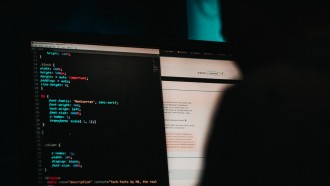Late last year, Japan has been intending to significantly expand its military cyber defense division by recruiting numerous personnel. Presently, the reason behind this move seems clearer. It was disclosed that Chinese hackers had established an enduring and profound presence within Japanese defense networks.

(Photo : ISSOUF SANOGO/AFP via Getty Images)
A woman uses a laptop on April 3, 2019, in Abidjan. - According to the figures of the platform of the fight against cybercrime (PLCC) of the national police, nearly one hundred crooks of the internet, were arrested in 2018 in Ivory Coast.
Gaining Unauthorized Access to Japan
A concerning revelation came to light at the National Security Agency in 2020. Classified defense networks belonging to the United States' key strategic partner in East Asia had been infiltrated by Chinese military hackers. Engadget reported that operatives from the People's Liberation Army had successfully gained unauthorized access to Japan's highly confidential computer systems.
Maintaining extensive and enduring access, the hackers seemed driven to acquire any available information, ranging from plans and capabilities to evaluations of military vulnerabilities. This insight comes from a group of three former high-ranking U.S. officials, who were part of a larger pool of both current and past U.S. and Japanese officials interviewed.
Efforts have been undertaken by Tokyo to enhance the resilience of its networks. However, these measures are still regarded as inadequate in shielding them from Beijing's intrusive gaze. This concern, officials assert, has the potential to hinder more extensive intelligence exchange between the Pentagon and Japan's Defense Ministry.
Telling Japan About the Hack
Nikkei Asia reported that the intrusion that occurred in 2020 was of such disconcerting nature that both Gen. Paul Nakasone, leading the NSA and U.S. Cyber Command, and Matthew Pottinger, the former White House deputy national security adviser, swiftly traveled to Tokyo.
They conducted a comprehensive briefing for the defense minister, whose level of concern was so substantial that he arranged for them to directly inform the prime minister. In their communication with Japanese authorities, they conveyed that Beijing had infiltrated Tokyo's defense networks, resulting in one of the most impactful cyber breaches in the nation's history.
The Japanese officials were surprised by this revelation but expressed their intent to investigate the matter. Upon their return, Nakasone and Pottinger held the belief that they had effectively emphasized their point, as recounted by a former senior defense official who was briefed on the situation.
Also Read: U.S. Companies Shift Supply Chains Away from Chinese Suppliers Amid Trade Relations
US' State
While in Washington, former President Donald Trump was preoccupied with disputing Joe Biden's election win, and his administration members were getting ready for a transition of power. As part of the transition process, senior national security officials briefed Jake Sullivan, the incoming national security adviser.
However, the incoming Biden administration was confronted with a multitude of challenges, including addressing a significant Russian cyber intrusion into U.S. agency networks, which had been uncovered during the Trump era. Amidst these concerns, certain U.S. officials perceived that the Japanese government might have been hoping for the issue to gradually lose significance.
As the early months of 2021 unfolded, The Washington Post reported that the Biden administration had firmly established itself, and experts in cybersecurity and defense came to recognize that the issue had not been resolved; the Chinese hackers were still entrenched within Tokyo's networks.
Subsequent to this realization and under close American observation, the Japanese authorities have publicly declared their intention to elevate network security measures. They have outlined plans to enhance the cybersecurity budget by ten times over the upcoming five years and to expand their military cybersecurity personnel fourfold, reaching a total of 4,000 individuals.
Related Article: China Allegedly Installs Surveillance Malware in US Systems in Guam, Microsoft Says






